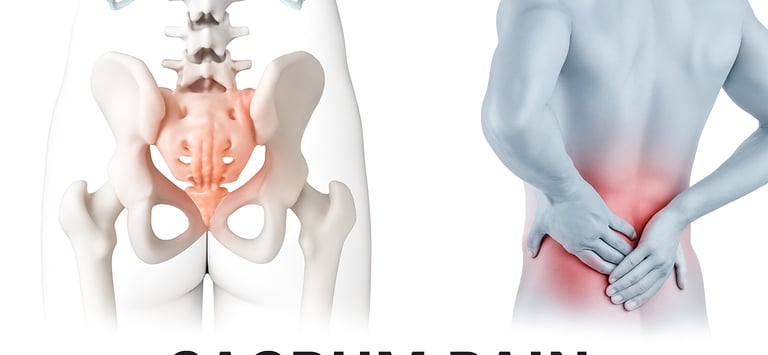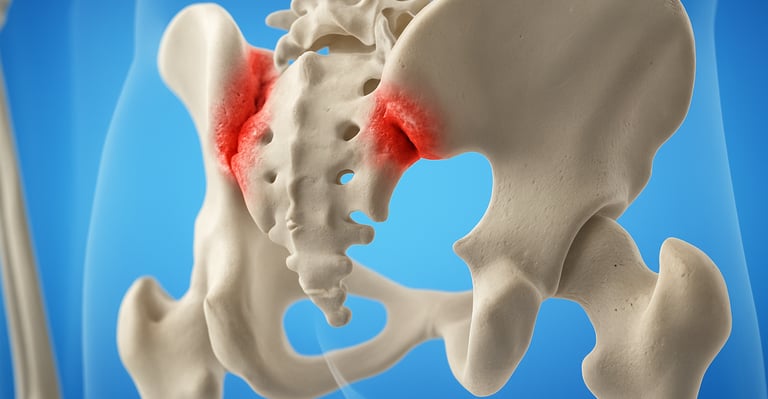Effective Relief for Lower Back and Hip Pain Without Surgery
What Is SI Joint Dysfunction?
The sacroiliac (SI) joints are located where the lower spine connects to the pelvis, supporting the weight of the upper body during movement. When one or both SI joints become inflamed, misaligned, or move abnormally, it leads to a condition known as SI joint dysfunction. This can cause pain in the lower back, hips, or buttocks, and often mimics conditions like sciatica or a slipped disc.
SI joint dysfunction is commonly underdiagnosed, yet it plays a major role in chronic lower back and pelvic pain.
Common Causes of SI Joint Dysfunction
Direct trauma to the pelvis or lower back (falls, accidents)
Poor posture or prolonged sitting
Repetitive strain from running, lifting, or twisting
Muscle imbalances in the core, hips, or glutes
Pregnancy or childbirth, due to pelvic ligament stretching
Arthritis or joint degeneration (osteoarthritis, ankylosing spondylitis)
Leg length discrepancies or spinal alignment issues
Previous spinal surgery (especially lumbar fusions)
Signs and Symptoms of SI Joint Dysfunction
Pain in the lower back, buttocks, or groin region
Pain that worsens with prolonged standing, walking, or climbing stairs
Pain that reduces when lying down or changing positions
Stiffness or tightness in the hips and pelvis
Difficulty sitting or rising from a seated position
Pain during activities like turning in bed, bending, or twisting
Uneven weight distribution while standing or walking
Referred pain to the thighs (not typically below the knees)
Best SI Joint Dysfunction Treatment at Home
- in Gurugram & Delhi NCR




Effective SI Joint Dysfunction Treatment
At Myo Physio at Home, we focus on non-surgical, drug-free solutions that relieve SI joint pain and restore function, right in the comfort of your home. Our approach addresses the root cause of the dysfunction and includes:
Pain Management
Use of cold or heat therapy to reduce inflammation
Electrotherapy modalities like TENS or IFT for pain modulation
Gentle joint mobilizations to improve SI joint alignment and mobility
Manual Therapy
Soft tissue release of tight muscles around the pelvis and lower back
Myofascial release and trigger point therapy for referred pain
Joint traction techniques to reduce compression on the SI joint
Postural Correction
Realignment techniques to improve pelvic symmetry
Training for neutral spine and pelvic positioning during daily tasks
Posture education for sitting, standing, and lifting
Muscle Rebalancing
Strengthening weak muscles (glutes, core, pelvic floor)
Stretching tight muscles (hip flexors, hamstrings, piriformis)
Functional movements to retrain proper load distribution
Ergonomic and Lifestyle Advice
Workplace and home posture modifications
Recommendations for safe movement patterns
Instruction on avoiding harmful movements and postures
Role of Physiotherapy in SI Joint Dysfunction
Physiotherapy is a key component in both the treatment and long-term management of SI joint dysfunction. At Myo Physio at Home, our physiotherapists create a customized rehab plan that includes:
Manual mobilization techniques for joint correction
Core stabilization exercises to support the pelvis and spine
Targeted strengthening of gluteal and hip stabilizers
Flexibility training to relieve compensatory tension
Gait and balance correction for even weight-bearing
Pain education to prevent fear-avoidance behavior
With consistent at-home physiotherapy, most patients notice a significant reduction in pain and improvement in daily function within weeks.


How to Prevent SI Joint Dysfunction
Preventive care is vital for long-term joint health and mobility. We guide our patients in developing sustainable habits to avoid recurrence.
Maintain good posture while sitting, standing, and walking
Avoid prolonged sitting and frequently change positions
Incorporate regular low-impact exercise (walking, swimming, yoga)
Strengthen core and hip muscles to stabilize the pelvis
Use proper techniques while lifting, bending, or twisting
Address any leg length differences or foot mechanics issues
Stay active and avoid sudden overload on the lower back
Follow ergonomic advice for workplace and household tasks
Why Choose Myo Physio at Home?
Home-based treatment plans tailored to your lifestyle
Certified physiotherapists with expertise in SI joint rehabilitation
Non-invasive, evidence-based care without medications or injections
Safe and effective recovery without hospital visits
Serving residents of Gurugram, Delhi NCR, Noida, and Faridabad
We focus on helping you move pain-free, improve stability, and regain your independence—all from the comfort of your home.
Areas We Serve
Gurugram
Delhi NCR
Noida
Faridabad
Get in touch
Quick Links
Health
Recovery
myophysio312@gmail.com
+919811527312
+918810530087
© 2025. All rights reserved. - Myo Physio At Home


